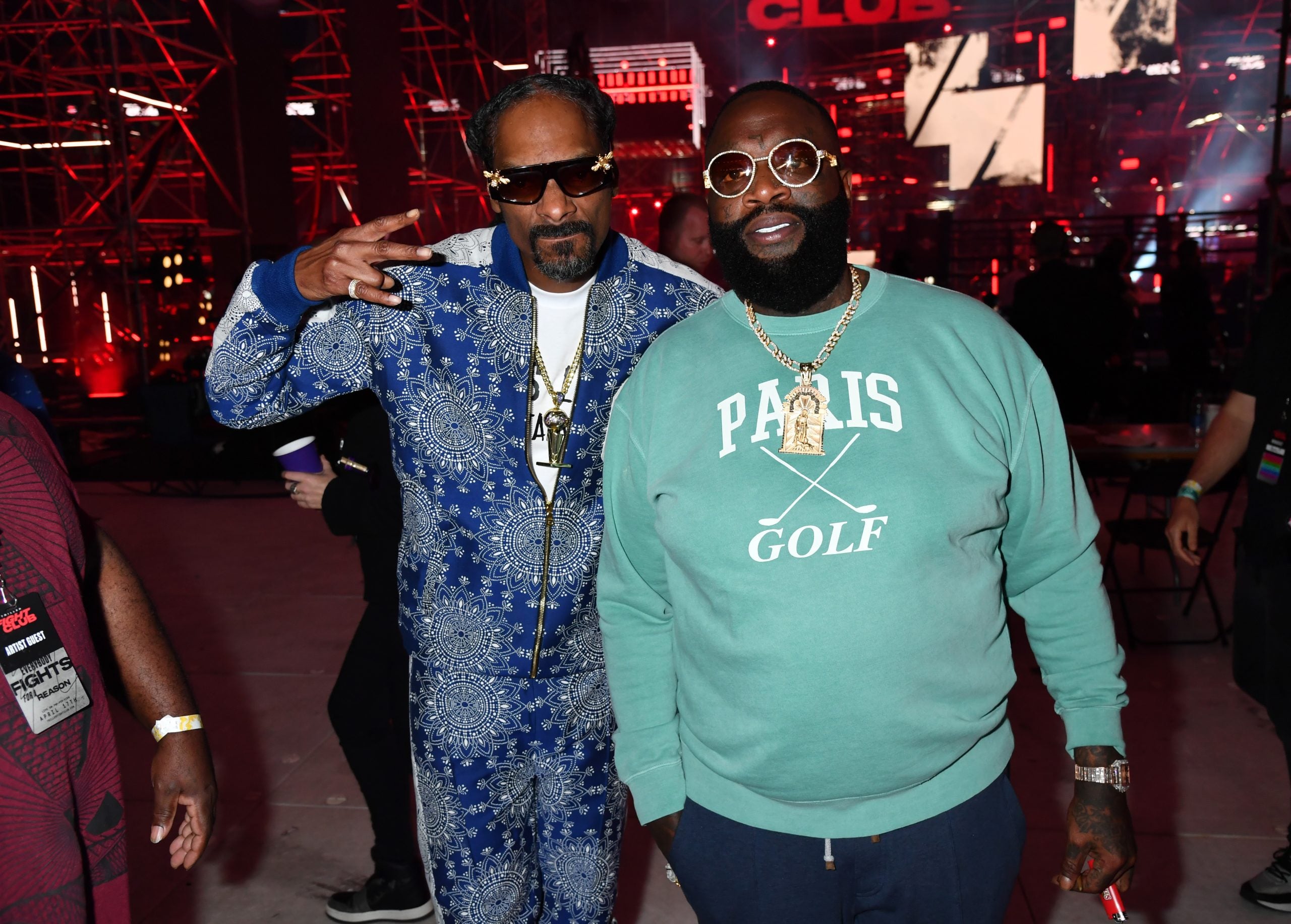The inauguration of President Donald Trump on January 20, 2025, marked not just a political transfer of power but a cultural inflection point. Few could have predicted the lineup of artists chosen to perform, but Snoop Dogg, Nelly, Soulja Boy, and Rick Ross—four figures deeply ingrained in the fabric of hip-hop—are in the number of artists slated to perform to mark this controversial moment in history. Their participation sparked an uproar, not only for the optics of Black artists aligning with Trump, but for what it revealed about the blurred lines between cultural influence and political power.

Snoop Dogg’s appearance at the pre-inauguration Crypto Ball felt particularly jarring. Known for his scathing criticisms of Trump—most famously vowing in 2017 to “roast the fuck out of” any Black artist who performed at his events—Snoop now headlined an event hosted by David Sacks, a Silicon Valley mogul dubbed the “White House A.I. and Crypto Czar.”
Once a steadfast critic of Trump’s policies, Snoop’s presence on this stage left fans questioning whether financial incentives or a strategic rebranding motivated his change of heart.
Nelly, who performed at the Liberty Ball, attempted to deflect criticism by framing his decision as respect for the office of the presidency rather than the man occupying it. In a Youtube interview with Geto Boys’ Willie D, Nelly said, “I respect the office. This isn’t politics. Politics for me is over; [Trump] won, he’s the Commander-in-Chief.”
The ‘Hot In Herre’ rapper went on to say, “I was born in a military base in Austin. My father served, my grandfather served, my uncle served, my auntie served. I’ve been entertaining the troops all over this world,” he added. “If these people can give their live for the office, Nelly can perform for it.”
Nelly’s defense, invoking his military background and his long-standing tradition of entertaining service members, attempted to divorce his art from the politics of the day. Yet, the question remains: is it truly possible to perform at such a politically charged event without being seen as tacitly endorsing the administration? Can an artist justify participating in an inauguration while maintaining the façade of political neutrality?
Soulja Boy and Rick Ross, who are set to perform alongside Snoop at the Crypto Ball, once again aligning themselves with the technology and crypto industries, which have increasingly prioritized profit over the political struggles of the communities these artists represent. For Soulja Boy, whose career has been defined by cultural disruption, the event felt like an extension of his brand—a space to navigate the tech world that continues to shape modern culture. However, for critics, his appearance embodied the troubling trend of celebrity figures aligning themselves with Silicon Valley’s new class of power brokers, often at the expense of the very communities their music once spoke for.
Several well-known athletes, including football’s Antonio Brown, boxing’s Mike Tyson, and hockey’s Evander Kane, were also reported to be attending, according to a source familiar with the event’s attendance list, as reported by NBC News. Their presence highlighted the growing intersection of sports, celebrity culture, and political influence, prompting questions about the underlying catalyst behind these high-profile affiliations.
Joining these athletes in showing support for Trump were rappers Rod Wave, Kodak Black, and Fivio Foreign, all of whom had explicitly backed Trump both through their music and event appearances. Florida rapper Kodak Black, endorsed Trump publicly, and even personally thanked him for granting him a pardon during his time in prison. Fivio Foreign, also lent his support to Trump, creating a rap record with Black, dubbed “ONBOA47RD,” in support of the president.
Critics from all corners weighed in. On CNN, Keith Boykin was outspoken in his condemnation of the artists decisions. “It’s a huge dishonor to Black people. I mean, if you look at Donald Trump, the man who refused to rent to black people in the 1970s, who tried to lead a lynch mob against five black and brown kids in the 1980s for the Central Park case, who refused to allow Black casino workers to have a prominent place in his casinos in Atlantic City in the 1990s, who spent five and a half years lying about Barack Obama’s birth certificate in the 2000s, who came into office and then attacked Black people like Colin Kaepernick, who attacked Ruby Freeman and her daughter Shay Moss for simply doing their jobs in Fulton County election workers,” Boykin continued.
“You dishonor those people when you go and perform for this man, this man who has done nothing but dishonor black people. And just even last year, just last year, he was calling Haitian immigrants, accusing them of eating cats and dogs. This is not somebody that black people should be associated with and pretending to normalize. We should be challenging him. And it dishonors the legacy of Dr. Martin Luther King Jr., whose birthday we honor on Monday to celebrate this man.”
Boykin’s remarks highlight a stark tension: the question of whether participating in such an event constitutes an endorsement of Trump’s policies—policies that have historically vilified and marginalized Black people. This criticism is particularly pointed considering the long-standing relationship between hip-hop culture and resistance. Hip-hop, at its core, has always been about resistance, authenticity, and fighting for social justice—values that seem at odds with the rhetoric and actions of the Trump administration.
It’s notable to see the number of Black celebrities now aligning with Trump, especially in light of the intense backlash singer Chrisette Michele faced after performing at his inaugural ball in 2017. Her decision to take the stage at the event sparked widespread criticism, resulting in her being dropped by her record label, Capitol Records, and enduring significant personal and professional fallout. Today, the air seems different around public support of Trump.
It’s impossible not to think of Martin Luther King Jr.’s famous words today, on the day we celebrate his efforts for equality: “In the end, we will remember not the words of our enemies, but the silence of our friends.” Yet, these performances feel like more than just silence—they symbolized acquiescence. Angela Davis once asserted that “politics and political affiliation are bound up with and flow from participation in my people’s struggle for liberation.” To stand on that stage, in celebration of an administration with a contentious legacy, feels like a stark departure from that struggle.
“politics and political affiliation are bound up with and flow from participation in my people’s struggle for liberation.”
– Angela Davis
Back in 2017, Trump’s inauguration struggled to secure top-tier performers, with many artists declining as an act of defiance. Eight years later, the landscape has shifted. Whether the motivation was financial, professional, or a misguided attempt to build bridges, the participation of Snoop Dogg, Nelly, Soulja Boy, and Rick Ross signals a pivotal moment in culture.
Performing at a presidential inauguration is undeniably a legacy moment, but legacies are defined not just by the stages graced but by the values upheld. For these artists, this decision has ignited complex questions about the intersection of artistry, accountability, and the power of celebrity.
In a deeply polarized era, their presence speaks volumes about the role of Black artists in shaping—and navigating—power. In the time following the inauguration and the discourse evolves, one thing is certain: the performances at Trump’s inauguration will leave a lasting imprint on their careers, reshaping both their legacies and the cultural conversation for years to come.







